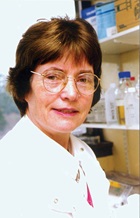The American Society of Hematology Honors Freda K. Stevenson, DPhil, and Brunangelo Falini, MD, with the 2018 Henry M. Stratton Medal
(WASHINGTON, August 14, 2018) – The American Society of Hematology (ASH) will recognize Freda K. Stevenson, DPhil, of the University of Southampton and Southampton University Hospitals in the United Kingdom, and Brunangelo Falini, MD, of the University of Perugia and the Institute of Hematology and Bone Marrow Transplantation in Italy, with the 2018 Henry M. Stratton Medal for their seminal contributions to basic and clinical/translational hematology research, respectively.
The Henry M. Stratton Medal is named after the late Henry Maurice Stratton, co-founder of Grune and Stratton, the medical publishing house that first published ASH’s journal Blood. The prize honors two senior investigators whose contributions to basic and clinical/translational hematology research are well recognized and have taken place over a period of several years. Drs. Stevenson and Falini will accept their awards on Tuesday, December 4, during the 60th ASH Annual Meeting and Exposition in San Diego.
“It is a pleasure to be recognized by the ASH community,” said Dr. Stevenson, the basic science recipient. “Research in basic science continues to underpin clinical progress, and I am proud to have contributed to this interface in hematology.”

Dr. Stevenson is being recognized for her pioneering work in the biology of B-cell malignancies, such as lymphoma and chronic lymphocytic leukemia (CLL). She is credited with numerous contributions to the field, including the discovery that CLL consists of two significantly different subsets, one of which is associated with more rapid disease progression. This knowledge currently serves as a major indicator of prognosis and has also offered targets for drug therapies that are now demonstrating clinical efficacy. The publication of this work has been cited 1,886 times and earned Dr. Stevenson the Rai-Binet Medal from the International Workshop on Chronic Lymphocytic Leukaemia.
Dr. Stevenson was also the first to propose and test an anti-CD38 monoclonal antibody treatment for patients with multiple myeloma, the results of which were published in Blood and formed the preliminary basis for the development of the drug that is today known as daratumumab. Her other notable contributions include the discovery of a lymphoma-specific sugar target or “Achilles heel” of follicular lymphoma on B-cell receptors, which may be a target for future therapy. Dr. Stevenson also designed gene-based vaccines that work against tumor antigens to help provide long-term protection against cancer relapse. While initially used to treat lymphoma, this strategy is now being tested in solid tumors. For this work, Dr. Stevenson was awarded the European Hematology Association’s Jean Bernard Lifetime Achievement Award.

Dr. Falini, the recipient of the clinical research award, has made seminal contributions to the understanding of acute myeloid leukemia (AML) and hairy cell leukemia (HCL). His pioneering work in the field of hybridoma technology led to the generation of monoclonal antibodies that are widely used in the diagnosis of hematologic malignancies. His seminal discovery of nucleophosmin (NPM1) mutations in AML, starting from his immunohistochemical studies on anaplastic large cell lymphoma, suggested a new mechanism for disease formation in about one-third of AML patients. This discovery led to better prognostication of patient outcomes, the ability to molecularly monitor minimal residual disease, and perspectives for new therapeutic approaches. NPM1-mutated AML is now recognized as a distinct entity in the World Health Organization 2016 classification.
Dr. Falini is also credited with leading a team that discovered the BRAF-V600E mutation as the causal genetic event of HCL. This discovery led to the establishment of the first molecular diagnostic test for HCL. Dr. Falini also demonstrated the clinical activity of the BRAF inhibitor vemurafenib in patients with relapsed or treatment-resistant HCL.
“This award recognizes two decades of work in the field of lymphomas and leukemias using monoclonal antibodies and more recently genome-wide analysis techniques,” said Dr. Falini. “For me, the clinical work and research has always been inseparable. Clinical observations help me to understand that still a significant number of patients succumb to their malignancies, and this provides the strongest possible motivations for my research efforts, sometimes inspiring new ideas.”
Dr. Falini has served as a member of international committees for the classification of the lymphoid and myeloid disorders and has won several prestigious awards, including the 2010 Jose Carreras Award from the European Hematology Association, the 2012 Karl Lennert Lecture Award from the European Association for Hematopathology, the 2014 Leopold Griffuel Prize from the French Association for Cancer Research, and the 2017 prize for Scientific Excellence in Medicine from the American-Italian Cancer Foundation.
“The discoveries contributed by these two dedicated researchers have exponentially improved the specificity with which we can diagnose and care for our patients with hematologic malignancies,” said ASH President Alexis Thompson, MD, MPH, of the Ann and Robert H. Lurie Children’s Hospital of Chicago. “I am honored to present Drs. Stevenson and Falini with the Henry M. Stratton Medal.”
The American Society of Hematology (www.hematology.org) is the world’s largest professional society of hematologists dedicated to furthering the understanding, diagnosis, treatment, and prevention of disorders affecting the blood. For more than 50 years, the Society has led the development of hematology as a discipline by promoting research, patient care, education, training, and advocacy in hematology. ASH publishes Blood (www.bloodjournal.org), the most cited peer-reviewed publication in the field, which is available weekly in print and online. In 2016, ASH launched Blood Advances (www.bloodadvances.org), an online, peer-reviewed open-access journal.
CONTACT:
Sara Khalaf, American Society of Hematology
[email protected]; 202-552-4925